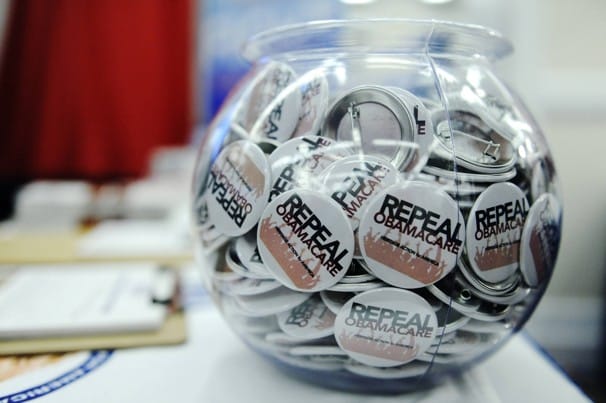'Obamacare': A Central Issue in the 2012 Presidential Election

In what will likely become a landmark decision, the Supreme Court of the United States has already commenced the three-day hearing on the constitutionality of the 2012 health care provision, or Affordable Care Act (ACA), that was signed into law two years ago by President Barack Obama. Most controversial is the law's "individual mandate", that requires every American be insured or face a monetary penalty.
With 42% of Americans opposing the individual health insurance mandate, the Republican presidential candidates have been vocal about their opposition, and while they agree on the need to appeal "Obamacare", their justifications vary. Here's a closer look at each of the Republican candidates' stance on health care reform:

Focusing on the 2012 election, Republican presidential candidate Rick Santorum took his campaign to the steps of the U.S. Supreme Court today, arguing that the center of the election should be health care reform. Likening Mitt Romney's health care plan to Obama's Affordable Care Act, he attacked GOP frontrunner Romney:
"If you really want to repeal Obamacare, there's only one person who can make that happen. Why would the Republican Party nominate someone who agrees with that mandate, on the most important issue of the election?"
In response to Santorum's attacks, Mitt Romney contends that his program was intended for Massachusetts, not the nation as a whole, and if nominated president, he too would repeal "Obamacare". He highlights Obama's failures on his campaign website, and outlines his plan to restore state leadership by giving "each state the power to craft a health care reform plan that is best for its own citizens."
Texas Congressman Ron Paul joins the rest of the Republican presidential candidates and strongly believes that "Obamacare" is an "unconstitutional monstrosity." If upheld under the pretext of the Commerce Clause, he argues, it will turn the government into a general police power. In line with his campaign message of liberty, he advocates a policy based on freedom-not force. He makes clear on his campaign website that if president, he would repeal "ObamaCare" based on the unconstitutional mandate that forces Americans to carry only government-approved health insurance or risk paying a fine. He has a detailed list of actions he would take to guarantee that insurance is a decision of the individual, not the state, and to ensure that the government "does no harm" to health care. Despite his strong convictions, he believes that the Supreme Court will rule it constitutional. He explains:
"This Supreme Court is slightly better than in the past, they haven't done a real good job in defending the free market and the original intent of the Interstate Commerce Clause.”
And while New Gingrich claims he is fervently opposed to the Affordable Care Act's mandate on individuals on his campaign website, a closer look at his past comments reveal his shifting stance on the issue of health care. The Washington Post recalls a 1993 appearance on NBC's "Meet the Press," where Gingrich reportedly said, "I am for people, individuals — exactly like automobile insurance — individuals having health insurance and being required to have health insurance.” This point was reiterated almost ten years later in an interview on NPR's "Talk of the Nation," and again more recently on a May 2011 appearance on "Meet the Press," where he implied he would support a "variation" of individual mandate.
Despite its negative connotation, Obama's campaign has readily embraced the term "ObamaCare" and started a campaign on Twitter urging supporters to share what they like about the health care reform law. Posted on the president's official Twitter account, he said, "If you're proud of Obamacare and tired of the other side using it as a dirty word, complete this sentence: #ILikeObamacare because...," a call to action that mobilized supporters to voice their opinions on his health care policy. Ultimately, however, it is up to the Supreme Court to decide whether Congress' power to enforce the individual mandate falls under the interstate commerce or not, leaving the presidential candidates powerless over this week's hearings.


